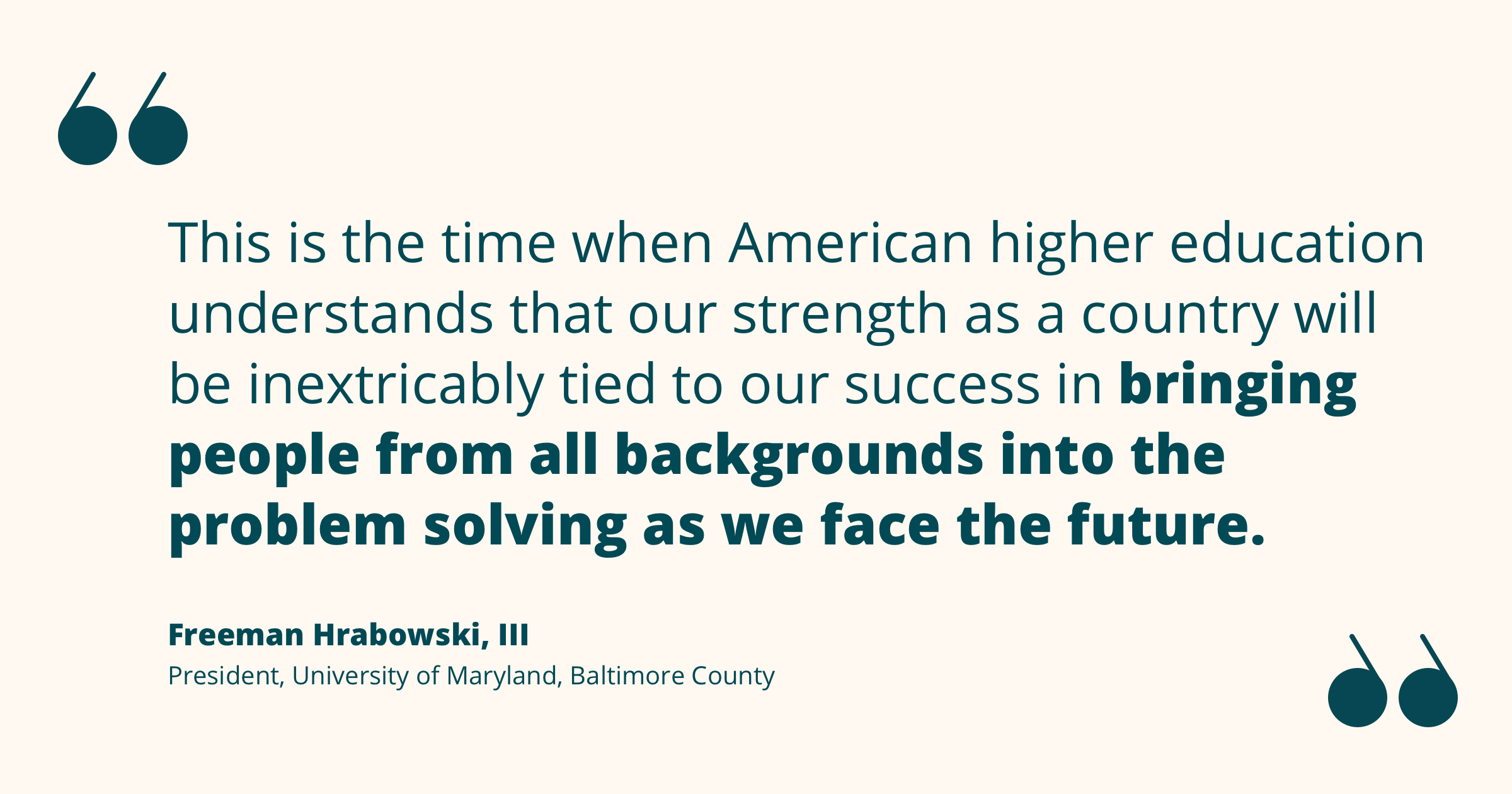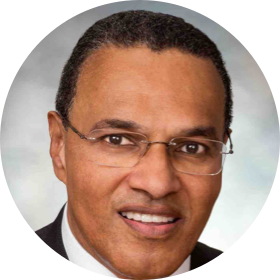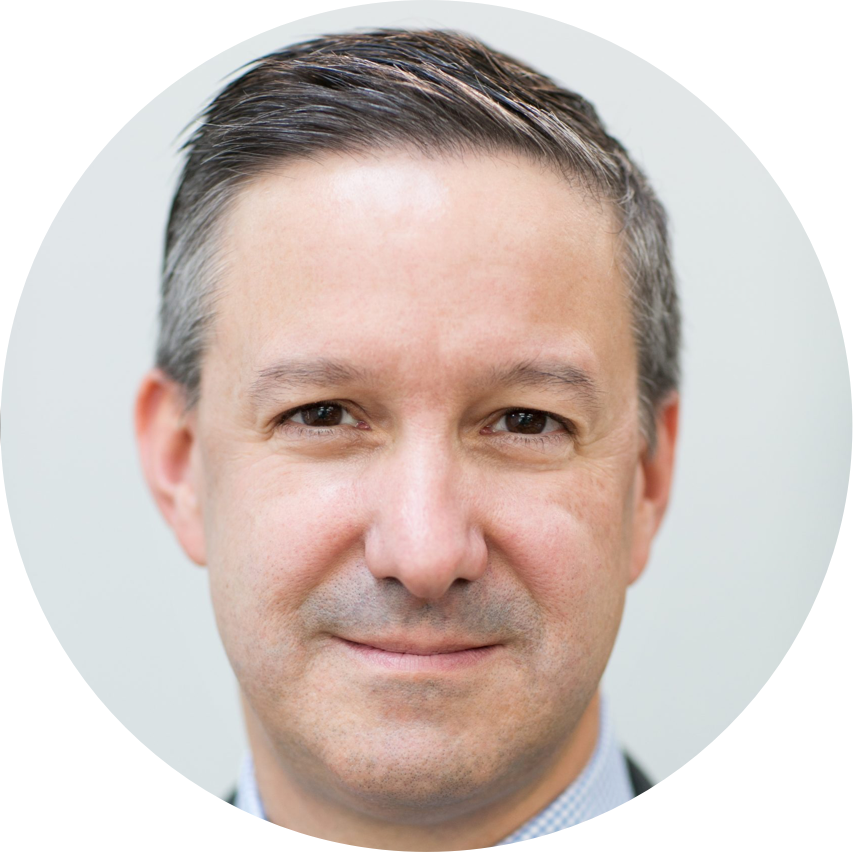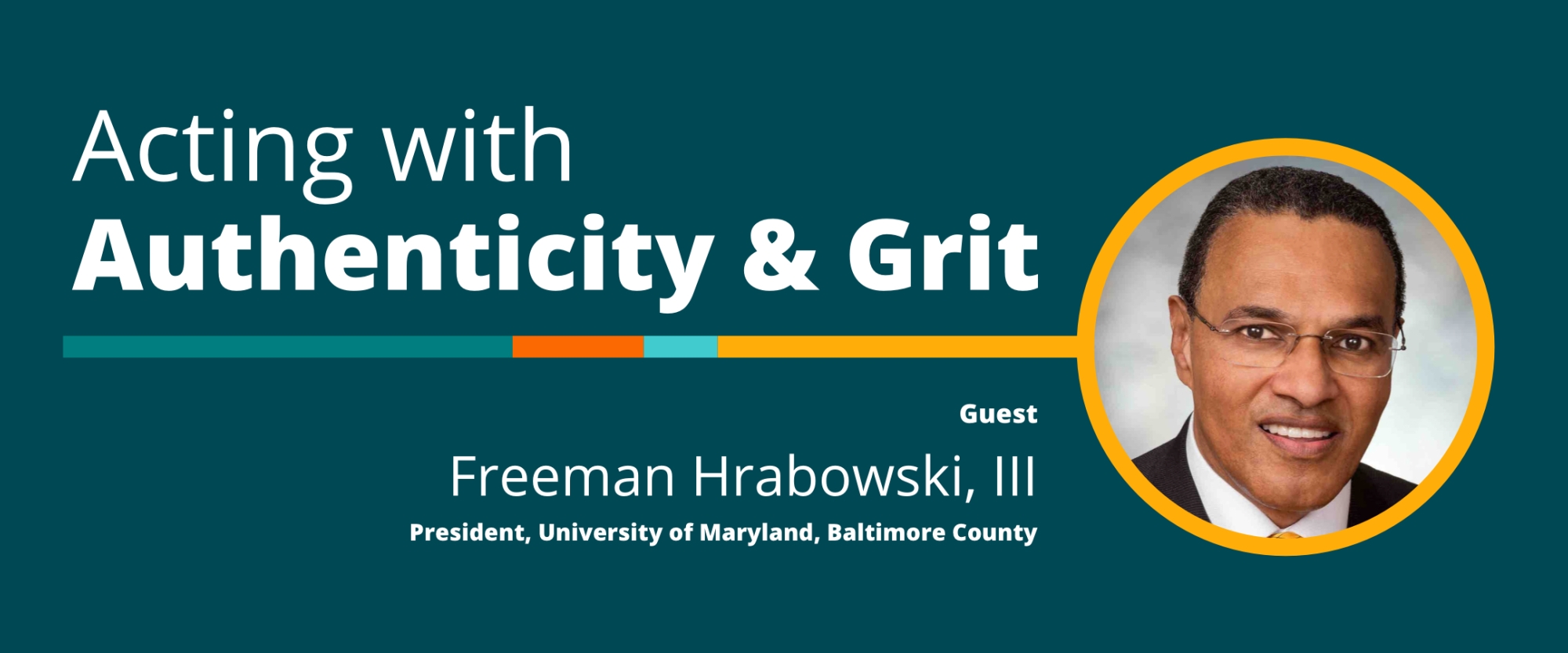Note: This interview, Episode 9 of the Weekly Wisdom Series, originally aired on June 15, 2020 as part of the University Innovation Alliance’s Innovating Together podcast, appearing live on Facebook, Twitter, and LinkedIn.
The University Innovation Alliance (UIA) proudly presents Innovating Together, a weekly podcast developed in partnership with Inside Higher Ed. I'm Executive Director of the UIA, and my podcast co-host is Jeff Selingo, author, journalist, and special advisor at Arizona State University. Our ninth conversation in Innovating Together's Weekly Wisdom series was a truly inspiring session with Dr. Freeman Hrabowski, president of the University of Maryland, Baltimore County (U.M.B.C.) for the past 28 years. His deep background as a child leader of the Civil Rights Movement in the 1960s instilled a vision for change that informs his work as a prominent higher ed leader in a time of COVID-19 and urgent calls for social change. We hope that you find his wisdom as positive and compelling as we did.
Tomorrow Can Be Better Than Today
When we asked President Hrabowski how he was coping during the pandemic, his answer was succinct. "My students give me strength and inspiration every day," he said, and immediately switched to the bigger picture. "This is a time that sheds light on our character as a country and as leaders, as educators, as universities. And we’re determined at U.M.B.C. to act with authenticity and to be honest with ourselves to say we can be better at whatever we’re doing. We want to show our students how to lead with not just authenticity, but with the kind of humility that suggests to people we can do this."
President Hrabowski, who has held his current position since 1992, recently published The Empowered University, a book in which he shares his perspective on leadership. "Think about the importance of community, of the people around you, of student leaders, faculty leaders, staff leaders," he told us. "It’s not just reaching the goal line. It is about how we get there, and that means showing people that in stressful times, we need to think about being supportive of each other, to keep a kind of calmness, to bring honesty to the work but to be able to say things in a way that we can hear each other. It's most important that we have a vision that tomorrow can be better than today."
He also reminded us that it's not the first time we've been in what seems like a painfully unique moment. "We have had problems before," he pointed out. "Racism is not new. We’ve had diseases before, and you can talk about ways in which they are the same and ways in which they are different. But what makes the difference will be our attitudes not only as leaders, but as people who are serving other people. And that’s what gets me through every day. From thinking back over the past 50 years of my career, seeing how people have been able to inspire us, even when the times were dark. We must keep hope and believe in this next generation."
Empowerment and Grit
Prior to his 28 years as a university leader, President Hrabowski spent years in the Civil Rights Movement, which has shaped his responses to the challenges of 2020.
"There’s no doubt that growing up as a Black child in Birmingham and marching with Dr. King and spending a week in jail, all those things were as awful as they could possibly be," he recalled, "and yet as empowering as they could possibly be. Because that statement I made about tomorrow can be better than today, that came from Dr. King. And I did see things improve. We have a long way to go, but my God, I did see so much progress over a number of years. And then my first year at U.M.B.C. before I became president, we had a Black student protest. And it was a very difficult time. My colleagues and I worked with students trying to understand their perspective, and we learned a lot, and we made changes based on what we heard.
"We’ve had other situations since then. Every campus goes through this. Every president knows what I’m talking about. And what I learned as a child, what I learned as a young administrator was that first of all, when we see these protests, they are a very important part of our democracy, when people feel empowered to say what they really believe; number two, that we only get better as we face the truth, the good, the bad, and the challenging, and then as we work on implementation."
President Hrabowski went on to compare the similarities between weathering the George Floyd protests and preparing for the 2020-21 school year during the pandemic. "In both cases, the more we can hear the voices of people and bring those voices to the table, and the more we listen to experts, the better off we are the next day. And the more we get knocked down by health or by these other challenges and we get back up, the stronger we can be. And when we use the word at U.M.B.C. 'grit' – that hard work, that resilience, and never giving up – now is the time we in America, in the world, and at U.M.B.C. must use that word and show it through our actions."
Higher Ed as Democracy
President Hrabowski's predictions and hopes for the future of higher education are intertwined. He told us, "American education is directly tied to democracy and to voting, and to bring into positions of power people who believe in higher education, people who believe in science and believe in the humanities. And we have a role to play. There is an initiative called Imagining America where my arts and humanities colleagues work with people from Syracuse to all kinds of campuses on looking at ways that the humanists and the artists can help change urban communities.
"Secondly," he went on, "I’ve just finishing writing an article with my colleagues on this shortage of people from diverse backgrounds in the scientific discussions, and the need to bring more people into the scientific enterprise so that they can bring those perspectives, looking at the disproportionate numbers of people of color or of African Americans and Latinos who are contracting this disease and actually dying. And so, whether we're talking about bringing people into public health, into medicine, into science, into policy, I’m thinking this is the time when American higher education understands that our strength as a country will be inextricably tied to our success in bringing people from all backgrounds into the problem solving as we face the future."

Effecting Changes and Meeting Challenges
As someone who has always embraced positive change, President Hrabowski hopes to see a number of permanent changes as higher ed emerges from the pandemic. "We have a tendency to romanticize the way we’ve always done things," he observed. "We need to rethink. My TED Talk talks about how we change the culture." His four pillars of college success in science are:
• Raising student expectations
• De-emphasizing the absolute value of test scores
• Scientists teaching science
• Building community on campus and through technology
Since change often follows challenge, he offered university leaders a four-point plan for dealing with challenges, whether they're COVID, student concerns, or budget issues: "As my colleagues, as my students write to me, particularly alumni, and are saying we have these problems in this department, the first thing to do is to not be defensive. Two, thank them for their courage; and three, listen carefully. And four, think about next steps so that you’re not just giving platitudes, but if you’re talking about things that can be done.
"I would say there will be stronger teaching and learning as a result of more people realizing we can be much better than we are," he went on. "That’s the message I want to send, that American higher education does some wonderful things, and yet we want to be secure enough to say we can be much better.
What It Means to Be Educated
President Hrabowski draws optimism from the challenges he sees in the underserved communities of Baltimore and D.C.
"Those of us in higher education who are presidents or part of the professory are very privileged," he said. "I think we have the chance become more enlightened and more sensitive to what so many human beings go through every day – the uncertainty, the illness, the racial tension, the economic issues – and this is all a part of life. And I think the more enlightened we become as a society, the more we’ll understand it’s about all of us, and it’s not just about those of us who are privileged. This is a time when the light is shining on the human condition. What I hope for is that we can help our students and our colleagues understand we should be preparing people to pay it forward, to want children of all backgrounds to feel they matter, to make sure Blacks matter and other groups matter, and most important to put ourselves in the shoes of other people. It seems to me that’s at the essence of what it means to be educated.
"My faith keeps me strong," he concluded, "and I know we made progress from the '50s and '60s up until a period. We are now seeing some real problems, but this is the human condition. We make progress, we slide back some, we learn things, and we move ahead. I have confidence that we as human beings and we as Americans will say, 'Enough is enough. We’re better than this.' That’s what gives me hope."
Links Mentioned in This Episode
• University of Maryland, Baltimore County
• The Empowered University: Shared Leadership, Culture Change, and Academic Success
• George Floyd protests (as reported in Time magazine)
• Imagining America
• TED Talk: Four Pillars of College Success in Science
Bios of Guest and Co-Hosts

Guest: Freeman Hrabowski, President, University of Maryland, Baltimore County
Dr. Freeman A. Hrabowski, III, has served as President of U.M.B.C. (The University of Maryland, Baltimore County) since 1992. His research and publications focus on science and math education, with special emphasis on minority participation and performance. He chaired the National Academies’ committee that produced the 2011 report, Expanding Underrepresented Minority Participation: America’s Science and Technology Talent at the Crossroads. He was named in 2012 by President Obama to chair the President’s Advisory Commission on Educational Excellence for African Americans. His 2013 TED talk highlights the “Four Pillars of College Success in Science.” Dr. Hrabowski and U.M.B.C. have made numerous "best of" lists, including U.S. News & World Report (2008), TIME magazine (2009), and the Harvard Kennedy School’s Center for Public Leadership (2011). He serves as a consultant to the National Science Foundation, the National Institutes of Health, the National Academies, and universities and school systems nationally; and on several foundation boards including The Urban Institute and the Baltimore Equitable Society. With philanthropist Robert Meyerhoff, he co-founded the Meyerhoff Scholars Program in 1988 for advancing underrepresented minorities in science and engineering. Dr. Hrabowski is the author of Holding Fast to Dreams: Empowering Youth from the Civil Rights Crusade to STEM Achievement, and co-author of Beating the Odds: Raising Academically Successful African American Males, Overcoming the Odds: Raising Academically Successful African American Young Women, and The Empowered University: Shared Leadership, Culture Change, and Academic Success. As child-leader in the Civil Rights Movement, he was prominently featured in Spike Lee’s 1997 documentary Four Little Girls, on the racially motivated bombing in 1963 of Birmingham’s Sixteenth Street Baptist Church. Freeman Hrabowski graduated from Hampton Institute with highest honors in mathematics. He received his M.A. (mathematics) and Ph.D. (higher education administration/statistics) from the University of Illinois at Urbana-Champaign.

Co-Host: Bridget Burns, Executive Director, University Innovation Alliance
Dr. Bridget Burns is the founding Executive Director of the University Innovation Alliance (UIA). For the past decade, she has advised university presidents, system chancellors, and state and federal policy leaders on strategies to expand access to higher education, address costs, and promote completion for students of all backgrounds. The UIA was developed during Bridget’s tenure as an American Council on Education (A.C.E.) Fellowship at Arizona State University. She held multiple roles within the Oregon University System, including serving as Chief of Staff and Senior Policy Advisor, where she won the national award for innovation in higher education government relations. She was a National Associate for the National Center for Public Policy and Higher Education, and has served on several statewide governing boards including ones governing higher education institutions, financial aid policy, and policy areas impacting children and families.

Co-Host: Jeff Selingo, author, journalist, special advisor at Arizona State University
Jeff Selingo is an author, a journalist, and a special advisor at Arizona State University. He has written about higher education for more than two decades and is a New York Times bestselling author of three books. His latest book, Who Gets In & Why: A Year Inside College Admissions, was published in September 2020 and was named an Editors’ Choice by the New York Times Book Review. A regular contributor to The Atlantic, Jeff is a special advisor for innovation and professor of practice at Arizona State University. He also co-hosts the podcast, FutureU. He lives in Washington, D.C. with his family.
About Weekly Wisdom
Weekly Wisdom is an event series that happens live on Facebook, Twitter, and LinkedIn. It also becomes a podcast episode. Every week, we join forces with Inside Higher Ed and talk with a sitting college president or chancellor about how they're specifically navigating the challenges of this moment. These conversations will be filled with practicable things you can do right now by unpacking how and why college leaders are making decisions within higher education. Hopefully, these episodes will also leave you with a sense of optimism and a bit of inspiration.
Rate, Review & Subscribe
Learn why hundreds of people have rated this new podcast 5 stars! Please join others and rate and review this podcast. This helps us reach and inform more people -- like you -- to help increase the number of college graduates in the United States.
Click here, scroll to the bottom, tap to rate with five stars, and select “Write a Review.” Then be sure to let us know what you loved most about the episode! Also, if you haven’t done so already, subscribe to the podcast. We’ll be adding a bunch of bonus episodes to the feed and, if you’re not subscribed, there’s a good chance you’ll miss out.

